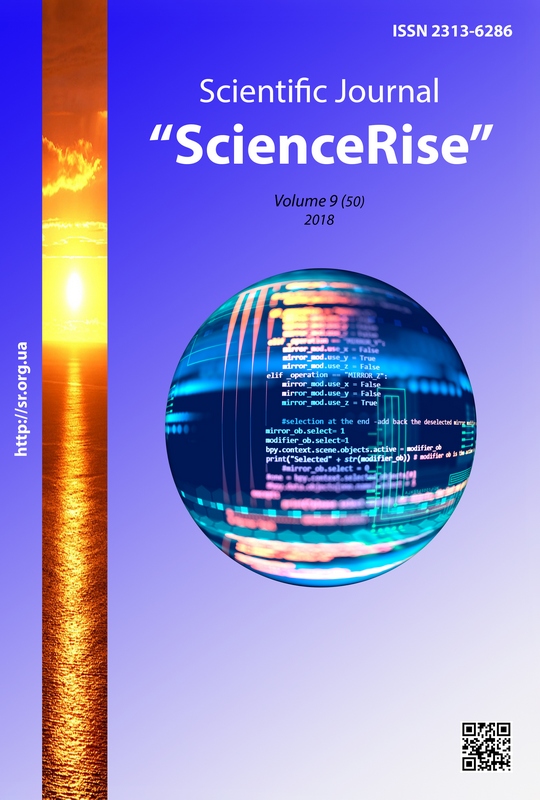Аналіз енергетичної ефективності комплексної модернізації типової радіаторної системи теплопостачання будівлі на базі автономного використання теплового насосу типу «повітря-вода»
DOI:
https://doi.org/10.15587/2313-8416.2018.143416Ключевые слова:
тепловий насос, енергозбереження, система опалення, коефіцієнт перетворення енергії теплового насосаАннотация
Представлено опис технічного рішення та апробація експериментальної установки на основі технології з використанням парокомпресійного теплового насосу типу «повітря-вода» для комплексної модернізації типової радіаторної системи теплопостачання будівлі соціально-адміністративного призначення. Проаналізована доцільність використання теплового насоса в опалювальний період при різних схемах підключення та розраховані відповідні коефіцієнти перетворення енергії теплового насосу
Библиографические ссылки
Matsevityy, Yu. M., Chirkin, N. B., Bogdanovich, L. S., Klepanda, A. S. (2007). About rational applying heat pump technology in the Ukrainian economy. Energy saving. Power engineering. Energy audit, 3, 23–29.
Stefanyuk, V. V. (2010). Supporting of the heat pump energy supply functioning by intellectual system. Eastern-European Journal of Enterprise Technologies, 3 (10 (45)), 33–35. Available at: http://journals.uran.ua/eejet/article/view/2901
Bezrodnyy, M. K, Prytula, N. A. (2016). Thermodynamic and energy efficiency of heat pump heat supply schemes. Kyiv: National Technical University of Ukraine “Igor Sikorsky Kyiv Polytechnic Institute”, 272
Galan, M. A. (2011). Heat pump – energy-efficient component of air conditioning systems. Heat pumps journal, 2, 25–30.
Basok, B. I., Belyaeva, T. G., Rutenko, A. A., Lunina, A. A. (2008). The heat pump systems economic efficiency analysis in the implementation for heat supply. Industrial Heat Engineering, 30 (4), 56–63.
Chiasson, A. D., Spitler, J. D., Rees, S. J., Smith, M. D. (2000). A Model for Simulating the Performance of a Pavement Heating System as a Supplemental Heat Rejecter With Closed-Loop Ground-Source Heat Pump Systems. Journal of Solar Energy Engineering, 122 (4), 183. doi: http://doi.org/10.1115/1.1330725
Khvorov, M. M., Leybovich, L. I., Korchevskiy, N. V., Dorundyak, N. M. (2006). Experience of applying heat pumps for heat supply in southern regions of Ukraine. Renewable energy, 1, 20–25.
EHPA Market and Statistics Report (2017). Available at: https://www.ehpa.org/about/news/article/european-heat-pump-market-and-statistics-report-2017-is-available-now/
Energy Strategy of Ukraine for the Period until 2035 "Safety, Energy Efficiency, Competitiveness". Database "Ukrainian Legislation" (2017). The Order of the Cabinet of Ministers of Ukraine No. 605-r. 18.08.2017. Available at: http://zakon.rada.gov.ua/laws/show/497-2018-%D1%80#n15 Last accessed: 03.09.2018
Lysenko, O. M. (2012). Estimation of individual thermal point separate modes of operation. Industrial Heat Engineering, 34 (7), 95–99.
Basok, B. I., Bieliaieva, T. H., Koba, A. R., Tkachenko, M. V., Nedbailo, O. M., Khybyna, M. A. et. al. (2009). Complex modernization of the building typical heat supply system on the basis of air-water heat pump. Industrial Heat Engineering, 31 (7), 19–21.
On priority directions of development of science and technology (2010). Law of Ukraine No. 2519-VI. 9.09.2010. Database «Ukrainian Legislation». Available at: http://zakon.rada.gov.ua/laws/show/2623-14 Last accessed: 09.03.2018
Nedbaylo, O. M. (2010). Use of a "air-water" heat pump in an existing centralized heating system. Compressor and power engineering, 2 (20), 32–36.
Basok, B. I., Nedbailo, O. M., Tkachenko, M. V., Bozhko, I. K., Lysenko, O. M., Lunina, A. O. (2015). Modernization of the building heating system using the air-water heat pump. Industrial Heat Engineering, 37 (5), 68–74.
Загрузки
Опубликован
Выпуск
Раздел
Лицензия
Copyright (c) 2018 Boris Basok, Aleksandr Nedbailo, Olena Tutova, Miroslav Tkachenko, Igor Bozhko

Это произведение доступно по лицензии Creative Commons «Attribution» («Атрибуция») 4.0 Всемирная.
Наше издание использует положения об авторских правах Creative Commons CC BY для журналов открытого доступа.
Авторы, которые публикуются в этом журнале, соглашаются со следующими условиями:
1. Авторы оставляют за собой право на авторство своей работы и передают журналу право первой публикации этой работы на условиях лицензии Creative Commons CC BY, которая позволяет другим лицам свободно распространять опубликованную работу с обязательной ссылкой на авторов оригинальной работы и первую публикацию работы в этом журнале.
2. Авторы имеют право заключать самостоятельные дополнительные соглашения, которые касаются неэксклюзивного распространения работы в том виде, в котором она была опубликована этим журналом (например, размещать работу в электронном хранилище учреждения или публиковать в составе монографии), при условии сохранения ссылки на первую публикацию работы в этом журнале .

